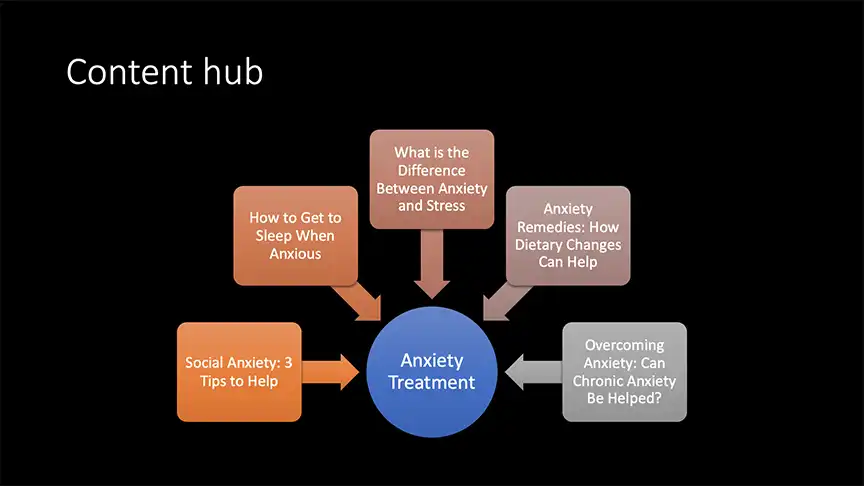As part of a ranking strategy Private Practice owners should utilize blog posts for their website. Why? Because blogs are a necessary component of a smart SEO strategy if practices are going to connect with their potential clients through Google.
Blogs are one of the most proactive means by which Private Practices can increase their potential rankings. They boost the rankings of Specialty Pages, so that those Specialty Pages connect with potential clients in the Private Practice’s area.
But what happens when a blog post ranks nationally? What happens if a blog post gets more traffic than any other post or page on your site?

The Purpose of Blogs
For Private Practice websites, the purpose of blogs is to support their Specialty Pages. That means blogs serve as a means within the silo structure—which we wholeheartedly recommend.
To be brief about it… the silo structure (also known as a content hub) means connecting blog posts and Specialty pages through an interlinking strategy.
So, if one of your Specialties is “Anxiety Therapy”, a blog post might be, “Strategies To Overcome Social Anxiety”.
Then the aforementioned links to the Specialty Page; and the Specialty Page links to the blog through a sidebar on the Specialty Page.
This—admittedly simple explanation—is called the silo structure. And the silo structure is why Private Practices should be blogging in the first place.
But we don’t want to talk about the silo structure in too much detail here. We want to focus on what happens when a blog post ranks really well on Google.

When A Blog Ranks High
Let’s imagine a Private Practice website with a blog post titled, “How To Tell If Your Partner Is A Narcissist?” (Niche posts on narcissism tend to get a lot of traffic.)
And our imaginary post is ranking #1 on the first page of Google for the term “is my partner a narcissist” which brings in 600 hits a month.
That’s a lot of traffic. First of all, where did it come from?
Unlike Specialty Pages, blog posts can rank nationally, meaning a blog related keyword can show up on the first page of Google for everyone in the country. (Sometimes, internationally too!)
Everyone across all 50 states searching the term, “is my partner a narcissist,” can land on the Practice’s website.
But while all that traffic may look good in Google Analytics, there’s a big question to ask: does all that traffic include a practice’s potential clients?
The answer is, “No.” The vast majority of traffic will be, not just people outside of their state but people who aren’t looking for therapy at all, but just want an answer to their query.
To be fair, some of that traffic will be people looking for therapy, and they could even be potential clients the practice can work with, thanks to agreements like Counseling Compact.
But, sometimes these really well ranking blog posts create a problem.
Irrelevant Traffic And A Full Inbox
Our above narcissism example is based on some reality. We know some practices who have experienced an influx in traffic thanks to a post about narcissism.
And they reached out to us because all of that traffic unexpectedly created an issue…
Their contact form was flooded with people who have no interest in therapy, but just want to know the answer to their query, “Is my partner a narcissist?”
So while their inbox was full, all those contacts were irrelevant. The people landing on their site were not going to work with the practice. They had no interest. They just wanted an answer to their question.
Thinking about it this way…
- 100% of the blog traffic will be from the entire country (and the world)
- 10% of that total blog traffic may be from your state
- 1% of that traffic may be relevant to your area
And these numbers can be very different depending on where your practice is located, but the notion remains the same: the amount of traffic that includes potential clients is very small.
Filtering the contact forms becomes a burden: it can be hard to sift and find the potential clients who want to work with the practice.
And then the Practice’s efforts have to shift to defensive marketing, to avoid all that irrelevant traffic clogging their inbox.
Blog Posts Can Skew Analytics
On that note we need to stress that blogs can create vanity metrics.
Your site may look like it’s performing extraordinarily well on Google Analytics. You may even get tens of thousands of views each month. But, if most of the views are coming from blogs, then they may not be relevant views (they’re not potential clients), and therefore they need to be treated accordingly.
That’s why, when we look at Google Analytics data, we stress focusing your attention on your homepage, your Specialty Pages, Contact page, etc.—basically everything outside of blogs— because we know these other pages are ranking for local terms, and, therefore, connecting with potential clients.
Blog Rankings Can Change
This also means that a Google Core Update can shake up your overall traffic. Why? Because, sometimes a Core Update will ping Google to rescan your site, and that blog post that was bringing in thousands of visitors is reranked.
Instead of your site, Google’s algorithm may determine that it wants to show a different kind of site for the keyword, such as medical journals or encyclopedic websites.
That’s OK. Remember, the purpose of blogs on Private Practice websites is to support your Specialty Pages, not bring in large numbers of national traffic.
OK. We’ve stressed all the ways blogs can be misleading.
But are well performing blog posts all doom and gloom?
What High Ranking Blogs Really Do
To answer the above… No.
High ranking blog posts that get a lot of traffic are still a boon for Private Practice websites.
Well-performing posts lift up the entire site: the more keywords your site ranks for, the more highly your site tends to rank overall, even locally.
So, in theory, if every single blog post you publish on your site was #1 for high-trafficked keywords, then your Specialty Pages would also rank highly in your local area.
(That’s highly unlikely to happen—probably even impossible—but the example still holds.)
Blogs help your site rank. It’s why we stress blogging so much. We just can’t get carried away by high-performing blog posts.
Successful Blogs May Not Bring In More Potential Clients, But They Do Help Your Site
Blog posts, on their own, likely won’t connect your site with potential clients. But when blogs rank well, they help elevate your site’s overall rankings.
So, even though a blog’s primary purpose is to serve as scaffolding for your Specialty Pages, when blogs perform well it’s a boon. (Just be cognizant of how well your blog posts are performing when taking a look at Analytics.)
When blogs perform well, they help your site’s overall rankings, and that means other pages, like Specialty Pages, are more likely to rank well and connect with potential clients.

